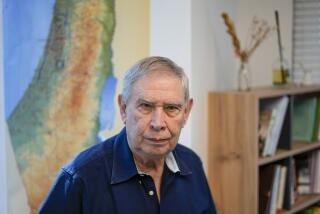Yeltsin Shuts Security Unit for Failures : Russia: The intelligence agency had not predicted the strength of the ultranationalist party. The president says it was mostly the angry poor who backed its right-wing leader in election.
- Share via
MOSCOW — President Boris N. Yeltsin, lashing out at the intelligence agency that appears to have failed him repeatedly in recent weeks, denounced the Russian Security Ministry as “unreformable” on Tuesday and abolished it.
In its place, he created a new Federal Counterintelligence Agency to function under the same chief, Nikolai Golushko, but meant to break decisively with Russia’s long line of secret police structures. By requiring all employees to reapply for clearance, he signaled a broad purge to come.
“The system of the organs of the VChK-OGPU-NKVD-MGB-KGB-MB turned out to be unreformable,” the decree said, listing all the acronyms for the secret police since the Russian Revolution of 1917. “Attempts to reorganize it in recent years have been mostly outward and cosmetic.”
Yeltsin’s abolition of the Security Ministry was his most drastic response yet to the surprise success of ultranationalist Vladimir V. Zhirinovsky in the Dec. 12 elections. It appeared to reflect, at least in part, his fury at having been caught unawares by Zhirinovsky’s popularity.
Top Kremlin officials say that the Yeltsin camp realized only two days before the elections what a serious threat Zhirinovsky represented, and by then it was too late.
Yeltsin’s administration also suffered from serious failures of intelligence during the political violence that developed out of the Russian president’s Sept. 21 decree dissolving Parliament, and the whole Security Ministry has appeared to be in disarray for months. Some of its employees ended up siding against Yeltsin in the fight over the Russian White House.
“At the present time there is a lack of a strategic concept for the state security of the Russian Federation,” Yeltsin’s decree complained. “Counterintelligence activity has been weakened.”
It accused the Security Ministry of costing too much and holding back reforms, and it gave Golushko two weeks to come up with a plan for its reorganization.
In his first direct public reaction to Zhirinovsky’s election success, Yeltsin said Tuesday that he believed it was mainly Russia’s angry poor who supported the right-wing populist.
By voting for Zhirinovsky’s party, “the poor voted not for the leader of this party and not for its program. They voted against poverty,” Yeltsin said during a visit to an exhibit of planned Moscow architecture, according to the Interfax news agency.
The comment came at a moment when Yeltsin’s Cabinet has been deeply split over the correct response to reformists’ election debacle--whether to push painful economic reforms faster or slow them down to prop up industry and boost social spending.
Yeltsin has yet to come down on one side or the other, but accounts of a meeting he held with advisers on political strategy said that he planned to “give reforms a more social orientation,” the Itar-Tass news agency reported. He is expected to render his verdict today at a long-awaited news conference.
Meanwhile, Zhirinovsky, whose misleadingly named Liberal Democratic Party of Russia far outpaced any other party in the Dec. 12 elections, was already launching his drive to gain political respectability.
He told reporters that he hoped to meet with President Clinton during the Moscow summit planned for mid-January, and then he set off Tuesday to visit Austria and Germany, according to members of his party.
“I am waiting for this meeting; I am ready,” he told the Reuters news agency in English. “I want to have a meeting with Bill Clinton here in Moscow.”
Clinton was unlikely to meet with Zhirinovsky; Vice President Al Gore already snubbed him during a visit last week and denounced Zhirinovsky’s views.
But the 47-year-old lawyer-turned-demagogue, who has already announced his plans to seek the Russian presidency in 1996, appeared to be making some progress in a different quarter--among the Communist Party leadership.
The leader of the resurrected Communist Party turned down reformists’ idea of creating an anti-fascist coalition and said that his party was willing to cooperate with any bloc in the new Russian Parliament.
Yeltsin’s advisers said their opinions had differed on how Yeltsin should deal with Zhirinovsky. Some said the Russian president should shun him, while others counseled him not to “raise barricades” against Zhirinovsky unless his actions went beyond the pale, and then to attack him legally.
Mikhail Poltoranin, one of Yeltsin’s closest advisers, said in an article published Tuesday that Zhirinovsky was a “depth gauge that has been used to measure the depth of the discontent in Russia.”
“There is another person ready to pop up from behind his shoulder--I can’t see his face, but I can see a general’s epaulets through the haze,” Poltoranin said.
More to Read
Sign up for Essential California
The most important California stories and recommendations in your inbox every morning.
You may occasionally receive promotional content from the Los Angeles Times.












